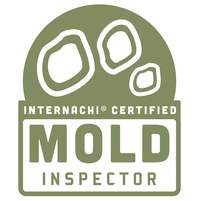Mold inspection

We do air sampling to test how much mold and other contaminants are in the air. The process includes taking a control sample outside to see what is around the home. Then we sample the inside of the home at least one sample taken on each level of the home, minimally one per thousand square feet. Then a swab sample of the furnace air filter or carpet to give us a long term contamination sample. We also will recommend swab sampling if a growth is found to test types and kinds of mold that may be growing.
Millions of homes across America have hidden water leaks that are promoting mold growth that can expose homeowners to mold spores. Mold has a potential to cause health problems like allergies, irritation (to lungs, eyes, skin, throat, nose) and are potentially toxic. Inhaling and touching mold spores may cause allergic reactions in sensitive individuals and normally healthy individuals may become sensitive to mold after exposure.
The EPA states that, "It is important to take precautions to limit your exposure to mold and mold spores. Avoid breathing in mold or mold spores". The EPA also recommends that if you suspect you have a hidden mold problem you should consider hiring an experienced professional to avoid exposure to potentially massive doses of mold spores.
Mold damages what it grows on. The longer it grows the more damage it can cause. If there is a mold problem in your home, you should clean up the mold promptly. Mold can be hidden, growing on the water from a hidden leak, and can develop into a potentially large problem if not caught in time.Testing your home on a regular basis is a prudent way to prevent small problems from growing into a costly and unhealthy situation, and always avoid exposing yourself and others to mold.
To find an inspector who offers mold testing services visit the International Association of Certified Indoor Air Consultants at www.iac2.org/members.php
Millions of homes across America have hidden water leaks that are promoting mold growth that can expose homeowners to mold spores. Mold has a potential to cause health problems like allergies, irritation (to lungs, eyes, skin, throat, nose) and are potentially toxic. Inhaling and touching mold spores may cause allergic reactions in sensitive individuals and normally healthy individuals may become sensitive to mold after exposure.
The EPA states that, "It is important to take precautions to limit your exposure to mold and mold spores. Avoid breathing in mold or mold spores". The EPA also recommends that if you suspect you have a hidden mold problem you should consider hiring an experienced professional to avoid exposure to potentially massive doses of mold spores.
Mold damages what it grows on. The longer it grows the more damage it can cause. If there is a mold problem in your home, you should clean up the mold promptly. Mold can be hidden, growing on the water from a hidden leak, and can develop into a potentially large problem if not caught in time.Testing your home on a regular basis is a prudent way to prevent small problems from growing into a costly and unhealthy situation, and always avoid exposing yourself and others to mold.
To find an inspector who offers mold testing services visit the International Association of Certified Indoor Air Consultants at www.iac2.org/members.php


